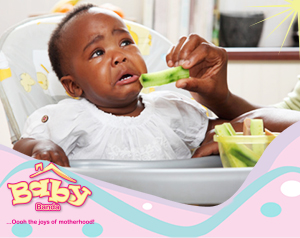Any baby who is between 12-36 months is generally referred to as a toddler. These years are usually characterised by a period of rapid growth and development. Children grow and develop at different rates. Your toddler may be taller, shorter, lighter or heavier than other toddlers the same age as this is usually influenced by genetic make-up, age, height, weight, gender, and activity level. As a parent, you should look at the overall growth pattern rather than comparing with other children to determine whether your baby is growing well.
Feeding habits of Toddlers
1. Messy meal times
As your toddler learns to feed themselves, they can be very messy. Some food will make it into her mouth but some may also be on the floor, her face and hands. Your little one learns best by imitation and watching you as you eat. Make a habit of eating together often. Let her do most of it herself and don’t get upset by the mess.
2. Disinterest in food
It is normal for a toddler’s appetite to go up and down. Trust your baby to know when he is hungry or full. If you try to force-feed your baby to eat more, he will likely eat less. Serve a wide variety of healthy foods. Offer less than you think he will eat and let him ask for more.
3. How much to eat?
Sometimes toddlers are not very hungry or not hungry at all. This is normal. Your job is to decide what, when and where to offer food. Your child’s job is to decide if she wants to eat and how much she wants to eat.
4. Growth Spurts
Your toddler will have times when he seems to want to eat all the time. This is normal as they have periods of intense rapid growth known as ‘growth spurts’. During this time, offer foods rich in energy e.g. starches to meet the demands of the body at this time.
Encouraging your baby to eat
• Eat the same meal together.
By this age, your baby should have transitioned to the family’s diet. Let your baby see you eating the same food and make mealtime a pleasant family time. Your good example will teach her how to enjoy healthy foods and how to use utensils.
• Offer her a variety of healthy foods.
Add at least one food you know he enjoys. Let your baby decide what and how much to eat. They do know when they are hungry.
Don’t pressure him to eat more or less by offering threats.
• Stick to a routine.
Serve her three meals and two or three snacks every day. Offer them at about the same times each day, two or three hours apart, with only water in between – this way the toddler is hungry at mealtimes. Avoid juices that fill up the stomach yet offer empty calories.
• Make it easy for her to learn to eat.
Provide the necessary utensils with short, broad, solid handles and forks with blunt ends. If possible, use unbreakable, shallow bowls or plates. These make it easier for her to pick up small pieces of food.
• Serve some foods she can eat with her hands.
Toddlers love finger foods. Since your toddler is not yet adept at using forks and spoons, they will still want to use fingers. Cut up pieces of food on the plate.
• Serve foods separately.
Most toddlers like to eat one food at a time. She will pick the rice first, then the beans then finally the carrots and courgettes. Buy a divided plate and put the foods separately and your baby might eat better than the mixing all the food together.
• Let your toddler seat comfortably.
Ensure that your baby is seated on the floor (you can use the Baby Banda Multipurpose Mat), or the comfortable chair of a ‘feeding’ high chair.
• Turn off the TV and put away toys.
Toddlers are easily distracted by the world around them. Keeping her environment free of these distractions will help her to focus on eating.
• Let the baby eat slowly.
If your toddler has not eaten much after 20-30 minutes, take away the food without comment. Let her leave the table when she is finished eating.
• Other tips
o Be positive and encouraging when your toddler has eaten or behaved well during a meal.
o If possible allow your toddler to be involved in choosing her food for the next meal. Only give 2 options or she could become confused.
o Encourage your toddler to participate in the food preparation e.g. sandwiches.
o Give your toddler salad and raw, grated vegetables if she prefers these to cooked vegetables.













